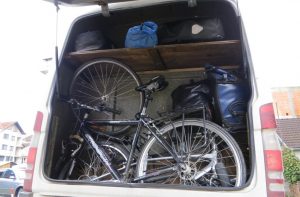The average Australian household sends a ton of rubbish to landfill each year on top of hard rubbish collections and rubbish generated outside of the home causing great damage to ecosystems [1]. Luckily, it’s easy to slash your household waste.
We’ll use the well-known slogan, reduce, re-use and recycle to demonstrate easy ways to slash your waste.
Reduce
- Before you buy something, assess its potential to become waste: Do you need it? Will you use it? Could you borrow it? Will it last? Is it single use only?
- Get rid of food waste through careful shopping, food storage and cooking.
- Better quality dry goods can be bought in bulk which minimises packaging and gets you better food for only a few hundred dollars more a year including delivery in some areas.
- If you drink milk alternatives, it’s possible to make your own at home. We make our own rice milk that is easy to make and cuts down 6kg of groceries to carry each week on the bike.
- Make takeaway at home to avoid wasteful pizza or fish and chip packaging. It’s easy, cheaper and healthier.
- Carry a bottle of water and some fruit and nuts for when you need something on the go.
- If you do buy takeaway occasionally, bring your own container. It’s easy to have a small container, knife, fork and straw in your backpack in case you get the munchies.
- For parents of very young kids, cloth nappies are now more user friendly than ever before and are much cheaper than disposable nappies over the long run.

Reuse
- Buy second hand if possible when you need something. It can be significantly cheaper, especially for quality items.
- Try to buy goods that can be easily repaired at home.
- If you no longer want something, sell it or give it away (friends, family, charity shop).
- Even old clothes make great cleaning rags or fabrics for projects.
- Reuse any plastic bags that come into your possession and carry some bags when you go to the shops.
- Old glass jars (check the lids) are great for preserving foods and for storing dried foods.
- Shop in the waste stream if possible; our portable garden beds, food storage containers and most of our furniture came from recycled materials saving us thousands of dollars.
- Use a composting system to turn kitchen scraps into gold for your veggie garden.

Recycle
- Recycling doesn’t always mean recycling; many plastics go into landfill and in some areas, tetra paks are not recycled [2].
- Because of this, reducing, reusing and repairing are the best steps to take before recycling.
- If you can’t compost something, put it into the green bin for industrial composting.
- Some councils are now allowing people to put food waste in the green bin. We should avoid food waste altogether, but this is better than nothing.
How far can you go?
- We put about 300kg of rubbish into our bins each year where 100kg is recycled, 100kg goes into industrial composting and 100kg goes to landfill each year.
- A friend of ours reduced his waste so much that he cancelled his bin services saving $500 a year.
Household waste is a useful indicator of how far your dollar is going. Many of these ideas not only cut down on waste, they cut down wasteful spending as well. Remember, some of the most frugal and stable societies on earth never had the word waste in their vocabulary.
Further Reading:
[1] We used the figure here of 600kg per person, multiplying for average household occupancy and taking out a third based on average recycling rates:
https://theconversation.com/capturing-the-true-wealth-of-australias-waste-82644
[2] http://www.ecolife.com/recycling/paper/how-to-recycle-tetra-pak-juice-boxes.html